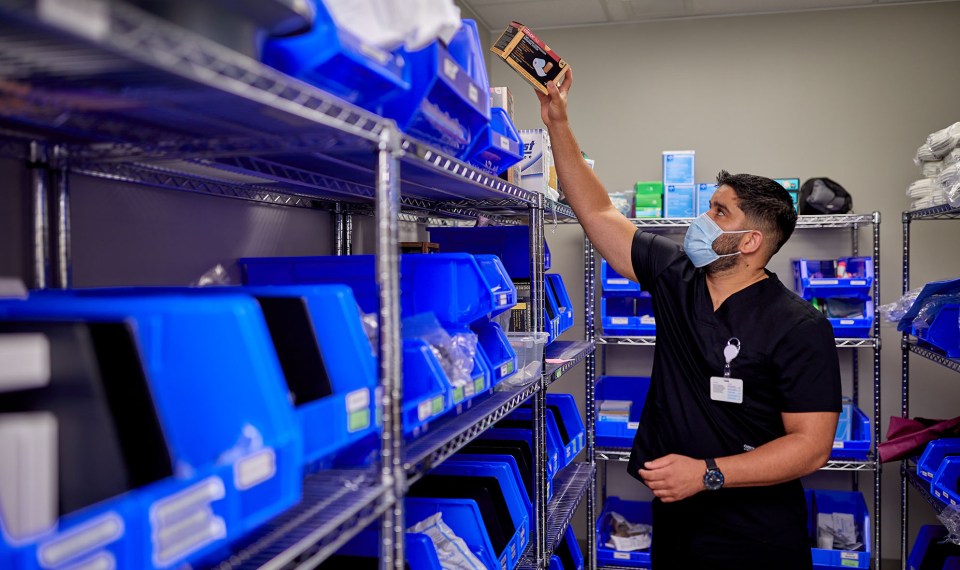As social unrest continues to shed light on areas where the nation could improve, many Company leaders are taking extra time to listen to employees’ perspectives and asking themselves how they personally can make change. In many instances, white leaders have a desire for change, and it is important to create a platform for them to listen and provide input.
Continuing our conversational series on inclusion and diversity, Encompass Health leaders Brenda Riordan, EVP, strategic operations, home health & hospice, and Rob McCallum, chief tax officer, came together to discuss how they are creating a workplace environment where employees and leaders are encouraged to speak up and have these difficult conversations.
Understanding different perspectives
Some of the recent events—from the tragic death of George Floyd to ongoing protests—have sparked the need for more meaningful and personal conversations about race and inclusion and diversity in the workplace. Riordan said she wants employees to feel comfortable having such discussions with leadership, noting that these conversations can help us better relate to those with different backgrounds and perspectives.
A recent conversation with Sam Gates, director of education, did just that for Riordan.
“A lot of people talk about how they don’t see color. Sam said it’s OK to see color; it’s not OK to treat people different because of their color,” Riordan recalled. “I thought that was a great perspective, and it really made me think about the commonly used phrase it in a different way. These honest conversations are really broadening our perspectives. I hope they can help change our homes, workplaces and communities.”
In addition to open conversations, McCallum said it’s important to include different perspectives in decision making.
“Diversity of thought leads to better decisions,” he said. “When we approach problems from different perspectives—and I’m not just talking about diversity of race, but gender, socioeconomic status, etc. —we make better decisions.”
Acknowledging we all have biases
In order to accept other perspectives, Riordan and McCallum both agree, you have to first face your own biases.
McCallum noted that all of us have unintentional or unconscious biases, but it’s critical to become aware of them and how they might impact our decision making.
Growing up in a small town, with little to no diversity, Riordan didn’t realize she had unconscious biases until she moved to large city.
“I was an OT student in Boston,” she said. “I remember an experience I had in class when a gentleman sat next to me. He was from the Middle East and was wearing a turban. I recall being scared of him, which was an irrational response as I had never met anyone from the Middle East and therefore had no reason to have this perspective. As I look back, it was an unconscious bias that made me feel that way. We ended up becoming good friends. It was one of the first times I became aware of unconscious bias through stereotyping, a lesson I am grateful for every day.”
Having open conversations about social injustices in the workplace
Race has almost been a taboo topic of discussion in the workplace. McCallum said that has to change, but that change can only occur if everyone can have those frank conversations without fear of retribution.
“We have to create an environment where people don’t fear initiating these conversations,” he said. “We need to empower leaders to reach out to their employees to ask ‘what’s your perspective’, or ‘how does this make you feel’ without fear of a human resources complaint. In addition, employees should feel comfortable speaking to issues they see without fear of retribution or of losing their job.”
McCallum also noted the importance of understanding how our words can impact others.
“We’re all guilty at times of saying things that are unintentionally offensive,” he said. “Our employees should be comfortable approaching each other to tell them how it made them feel without fear of retribution.”
At Encompass Health, Riordan said both employees and employers need to look no further than the Company’s values, The Encompass Health Way, for direction on creating a workplace environment that is accepting of all perspectives.
“I always come back to our values, one of which is ‘lead with empathy,’” she said. “Living through our values is the best way to continue to ensure inclusion and diversity in the workplace. From leading with empathy and ensuring that we listen to understand, to setting the standard to foster a culture of acceptance and inclusion, it is our belief that all people and perspectives truly make us stronger together.”
The content of this site is for informational purposes only and should not be taken as professional medical advice. Always seek the advice of your physician or other qualified healthcare provider with any questions you may have regarding any medical conditions or treatments.



